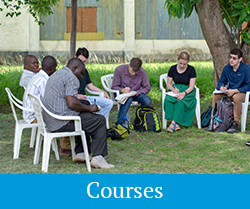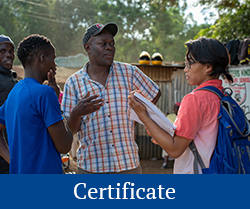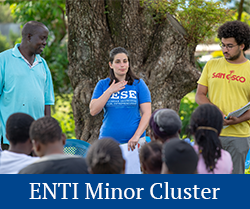
Past and Present Ventures
HESE is focused on social venture creation as both a means to teach the tools and methods of social entrepreneurship and for the very real purpose of launching the ventures themselves. Nearly every activity undertaken in the HESE program is directly related to advancing one’s venture.
3D Prosthetics
The burden of disability is felt strongest in developing countries, particularly in rural areas, where access to services and rehabilitative devices is limited. In regions where manual labor is the basis for economic productivity, amputations can have debilitating effects on individuals and families.
The 3D Prosthetics venture seeks to provide appropriate prosthetics that can limit the negative effects of amputation. To do this venture addresses concerns in four targeted areas:
- An analysis of the upper-limb prosthetic devices currently designed for the developing world context
- An exploration of manufacturing methods to determine the ideal method for a prosthetic hand, such as e-NABLE’s Raptor Reloaded
- An assessment of the range of tasks that can be successfully accomplished using the Raptor Reloaded. Would these address the likely needs of developing world users?
- An overview of the community of organizations, clinics, and hospitals working in Zambia to provide prosthetic services
Affordable Greenhouses
There are many benefits to greenhouses including increasing crop yield, increasing food security, reducing crop spoilage, and conserving water. Additionally, Greenhouses and help improve the livelihoods of farmers. A majority of greenhouses sold in sub-Saharan Africa are designed for commercial use and are too large and expensive for small farms.
Affordable Greenhouses’ goal was to create greenhouses that are easy to set-up and cheap. After field-testing approximately ten greenhouses in different climatic conditions and supply chain scenarios in Kenya, Tanzania, and Rwanda, the technology was licensed to a for-profit company in Kenya (Mavuuno Greenhouses) in 2012. In 2013, the technology was licensed to a social enterprise in Cameroon (Greenhouse Ventures, Ltd.) with six neighboring countries in its territory. In 2014, in collaboration with World Hope International, and with funding support from the USAID Securing Water for Food (SWFF) Program, a social enterprise called GRO Greenhouses was established in Sierra Leone, Mozambique, and Zambia.
Angel Aid
Angel Aid works to authentically combat disabilities. By mapping out the ecosystem of non-government organizations and using local volunteers Angel Aid works to increase the quality of life for people with disabilities in Sierra Leone. Families and community members have educated their health care workers and help people identify and understand disabilities. Quality of life is greatly improved by showing locals techniques to manage disabilities.
Biocynth
Biocynth makes bioplastics from invasive plant species, trying to increase the amount of quickly biodegradable plastics that are used in developing communities. Working with those who suffer the ill effects of these plants, they can at once incentivize the removal of these species and create a more sustainable alternative to petroleum-based plastics.
Inakua
Inakua developed a small scale aquaponics system that frees subsistence farmers from the fluctuations caused by climate changes. Their low-cost system includes appropriate education and starting materials that will free farmers from the risk and time of traditional farming methods.
Mashavu
Mashavu (“chubby-cheeked” in Swahili) is a telemedicine system that connects medical professionals in developing countries with individuals living in rural areas. The goal of Mashavu is to enable individuals living in resource-constrained communities to take an active interest in their health, regardless of proximity to a medical facility. Mashavu implements multiple methods of ensuring that healthcare reaches the farthest corners of Africa. Through paper, digital, and mobile-based communication methods, Mashavu ensures that everyone in Kenya can get fast and accurate medical care.
Matibabu
Matibabu co-developed a quick and non-invasive malaria test device that rural health care workers can carry around and re-use on patients without worrying about bloodborne contamination. The device will also allow the health care community to better understand how malaria is being contracted in a region.
SolStar
SolStar created a solar panel rating system designed to increase the number of quality solar panels reaching the African market. SolStar also raises awareness about solar power as an alternative energy source in Burkina Faso and the African continent to improve access to electricity. They offer a series of tests that certifies the quality of a solar panel. This certification carries with it the credibility and trust associated with well-known universities, Penn State and 2iE. In addition, SolStar conducts training sessions with retailers to improve solar panel sales in the region.
Ukweli Test Strips
The Ukweli Test Strips team (“truth” in Kiswahili) is developing low-cost, diagnostic test strips that screen for Urinary Tract Infections (UTIs) and type 2 diabetes. The strips will work by identifying biomarkers in urine. In the developing world, many UTIs go untreated because they go undetected. This leads to further serious health complications later.
At the core of Ukweli is a common, household or small-office inkjet printer that has been repurposed to manufacture diagnostic test strips. Strips provide easy-to-interpret results in under 30 seconds while costing only 1/10th the price of current screening methods. Ukweli distributes its test strips with a network of more than 1,000 trained and trusted community health workers throughout central Kenya.
- To learn more about HESE ventures and opportunities, contact:
- John Gershenson, Ph.D., HESE director
hese@psu.edu






